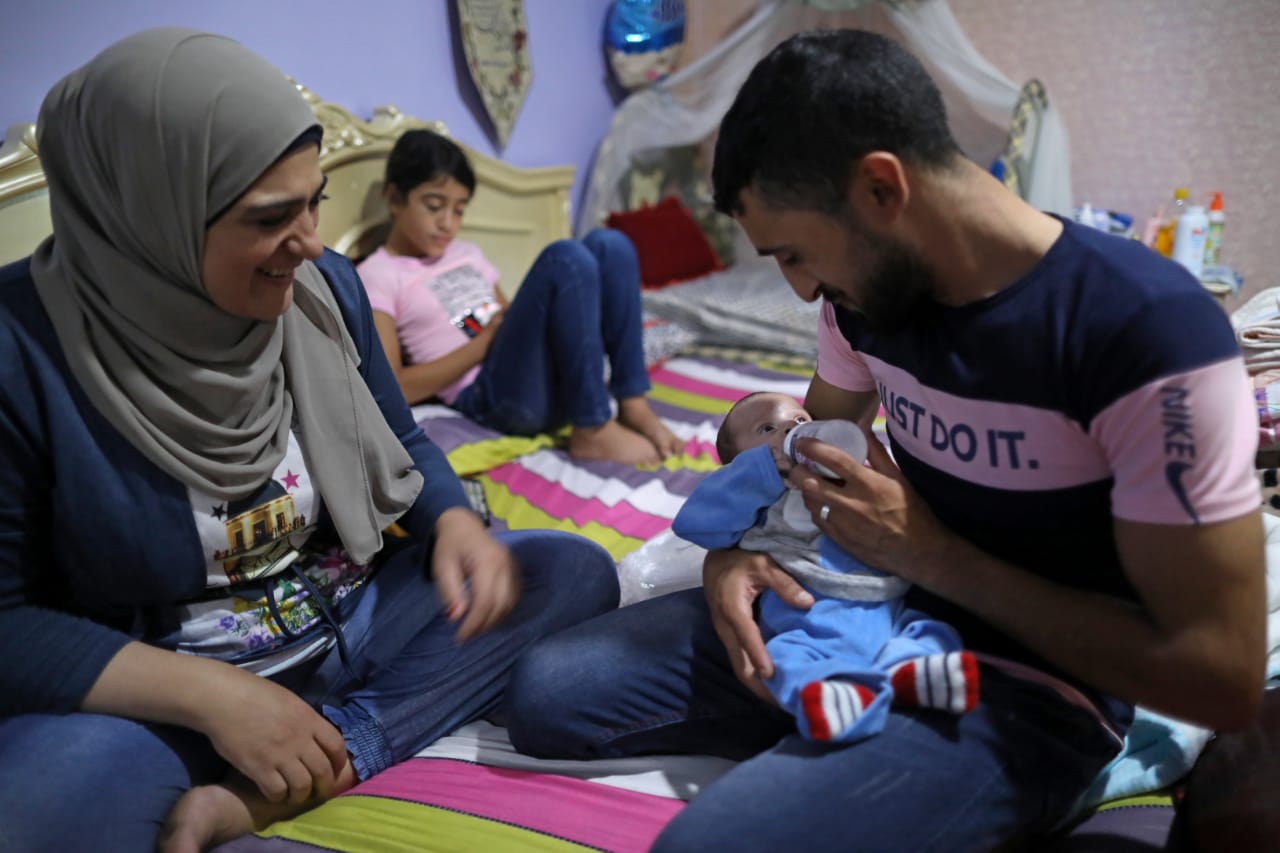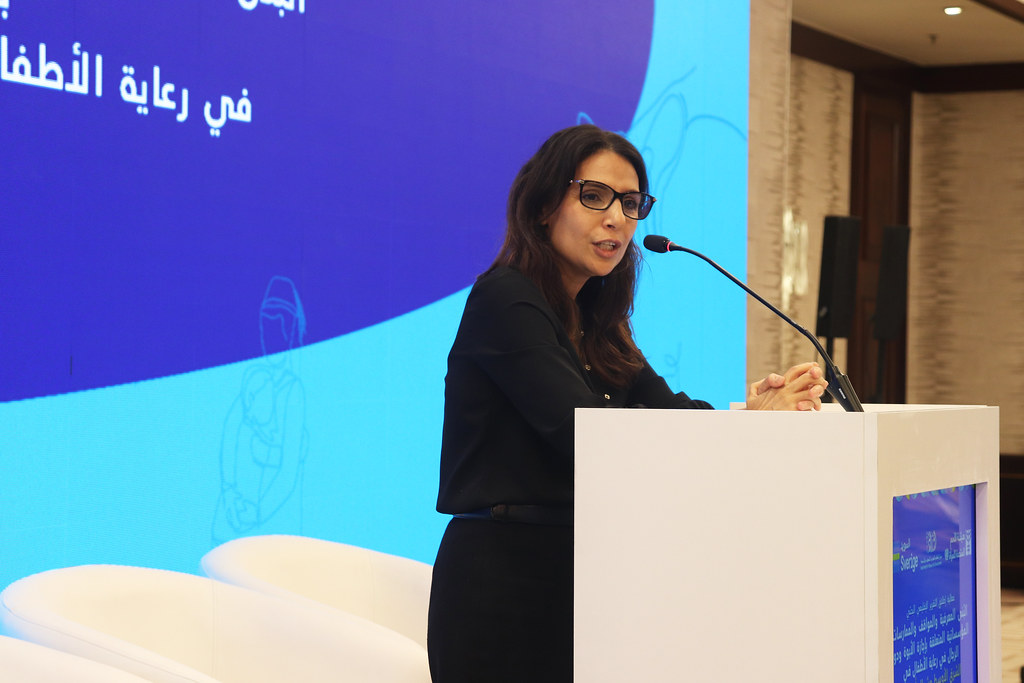Longer paternity leave in the Middle East and Northern Africa (MENA) region, a clear request of decision makers according to UN Women’s latest research
Date:
[Press release]
For immediate release

Longer paternity leave in the Middle East and Northern Africa (MENA) region, a clear request of decision makers according to UN Women’s latest research
-
Groundbreaking research of UN Women captures for the first time ever the views on paternity leave and men’s involvement in childcare from 1,154 decision makers from governments, private sector and civil society organizations from five countries in the MENA region: Jordan, Lebanon, Morocco, Palestine and Tunisia.
- 86 per cent of the decision makers surveyed for the research are in support of extending the duration of paternity leave in their countries. Further, 62 per cent of the decision makers believe that men’s involvement in childcare should be part of the national public agendas. In both cases, support is higher by female decision makers, when compared to males.
- 55 per cent of decision makers from public institutions surveyed for the research, and 52 per cent from private sector, are in favour of parental leave of equal duration for both parents. Interestingly, only 26 per cent in public sector and 36 per cent in private sector believe that their colleagues would be supportive of it, despite the de facto high levels of their peers support.
(CAIRO, AMMAN) 25 September 2023 – The new research of UN Women shows that contrary to common belief, decision makers in the Arab States region are overwhelmingly positive to paternal leave and men’s involvements in childcare.
The results of this study titled, Knowledge, Attitudes and Practices of Institutional Actors on Paternity Leave and the Role of Men in Childcare in the MENA Region, undertaken in partnership with the Arab World for Research and Development (AWRAD), are crucial to support policy makers in the region including governments, parliaments, private sector, labour unions, Civil Society Organizations, media and academia - through evidence on the importance of men’s childcare and paternity leave. It offers practical recommendations to support legal and policy changes that promote men's involvement in childcare, leading to not only increased well-being within families and more cohesive and gender-equitable societies in the MENA region, but also the increase of family income as more women enter the labour market.
These recommendations include promoting public awareness on the benefits of men’s involvement in childcare, expanding childcare services and family-friendly policies at the workplace to address the needs of both male and female employees with children and dependents, and pursuing legal reforms of labour laws for longer paternity leave, among others.
The report also shows that despite discriminatory social norms still perpetuating traditional gender stereotypes, there is a growing realization in the Arab world that caring practices and parenting responsibilities are critical to achieve gender equality and women's empowerment. The report highlighted that traditional discourses of childcare are already changing due to rapid social, economic, and political changes. These changes include economic pressures on the family unit, the shift from extended to nuclear families, the impacts of accelerated urbanization, decreasing fertility rates, improved gender equality in the workplace and in education, and increasing accessibility to modern technologies and social media.
As a result, the report indicated, families are increasingly relying on non-family caregivers, especially in urban settings, for young married couples, divorced or separated women, widows, and working married couples with children.
The positive results from this report focusing on decision makers, echo the results from UN Women’s research conducted from 2017 to 2022 showing that the majority of men in the Arab State region want to spend more time with their children. The new report provides promising data on how men's involvement in childcare can be supported and how it is a win-win for men and women, their families, societies and economies-at-large in the MENA region and beyond.
Quotes from Speakers at Launch Event of Research:
- “This groundbreaking study shows that 86 per cent of the decision makers in five Arab States are in support of extending the duration of paternity leave. This result perfectly matches the findings of UN Women’s recent studies that show that the majority of men in the region want to spend more time with their children. This evidence and the recommendations in the study, paves the way for the region to enable men to spend more time with their children which in turn enables women’s participation in the paid labour force, hence increasing the family income and overall well-being,” said Susanne Mikhail Eldhagen, Regional Director of UN Women for the Arab States.
- “This unique regional study provides meaningful insights about existing practices and beliefs around childcare and gender equality by decision makers in the MENA region. Its findings provide a mixed picture, however yet a promising way forward to help governments, private sector, CSOs and others to pursue further equality between men and women in childcare in the region,” said Camilla Redner, Counsellor from the Swedish Embassy in Jordan.
For media inquiries please contact:
- Montira Narkvichien
Chief of Communications, UN Women Regional Office for the Arab States
Email: [ Click to reveal ]
Mobile: (+20) 100 8527 266
Quote Sheet:
- “My son in-law is a doctor, as is my daughter. He refuses to assist his wife in taking care of his daughter while she is at home and when she is busy working outside the home. As a result, the girl’s grandmother is the one who takes care of her until her mother returns from work.” (Female, 50, key informant, civil society)
- “Society still considers a woman’s place to be at home, and if she goes out to work, then it is an additional burden for her to bear.” (Female, 36, key informant, private sector)
- “I believe a woman knows her home and her children better. This makes her primarily responsible for them. And some husbands, even when they help their wives don’t talk about it for fear of being viewed by the community as emasculated.” (Female, 39, key informant, state actor)
Notes to Editor:
The report, Knowledge, Attitudes and Practices of Institutional Actors on Paternity Leave and the Role of Men in Childcare in the MENA Region contains three chapters, including: Chapter 1 introduces the background, conceptual framework, and research methodology. Chapter 2 focuses on the role of men in childcare in the MENA region, examining attitudes, workplace discrimination, and perceptions of paternity leave. Chapter 3 discusses entry points and recommendations for future action.
About UN Women:
UN Women is the United Nations entity dedicated to gender equality and the empowerment of women. A global champion for women and girls, UN Women was established to accelerate progress on meeting their needs worldwide.
The regional research launched today was undertaken under the framework of UN Women’s regional programme ‘Men and Women for Gender Equality in the Arab States’ programme, generously funded by Sweden.
